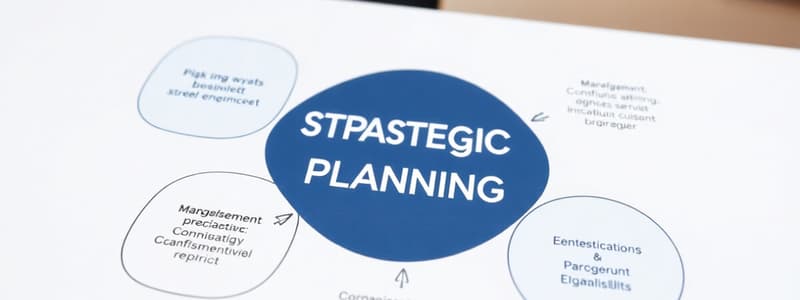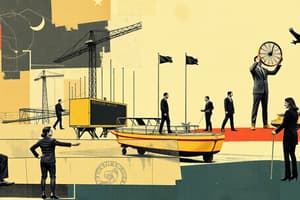Podcast
Questions and Answers
What is a primary function of management?
What is a primary function of management?
- Creating compensation packages for employees
- Establishing objectives and determining how to achieve them (correct)
- Developing employee interpersonal relationships
- Monitoring employee performance exclusively
Which role is NOT categorized under Henry Mintzberg's interpersonal roles?
Which role is NOT categorized under Henry Mintzberg's interpersonal roles?
- Liaison
- Monitor (correct)
- Figurehead
- Leader
What is the purpose of a mission statement within an organization?
What is the purpose of a mission statement within an organization?
- To assess the performance of the organization against competitors
- To outline the company's aspirations for the future
- To explain why the company exists and what it aims to accomplish (correct)
- To define the principles that guide decisions and behaviors
Which step is NOT involved in the strategic planning process?
Which step is NOT involved in the strategic planning process?
Which managerial role involves connecting with stakeholders?
Which managerial role involves connecting with stakeholders?
Which of the following components is NOT part of the balanced scorecard?
Which of the following components is NOT part of the balanced scorecard?
What is the primary focus of crisis management?
What is the primary focus of crisis management?
Which type of leader primarily controls the decision-making process without involving others?
Which type of leader primarily controls the decision-making process without involving others?
Which leadership style emphasizes employee empowerment and allows most decisions to be made by employees?
Which leadership style emphasizes employee empowerment and allows most decisions to be made by employees?
What is a characteristic of proactive change management?
What is a characteristic of proactive change management?
Which of the following is NOT an essential management skill?
Which of the following is NOT an essential management skill?
In the decision-making process, what is the first step?
In the decision-making process, what is the first step?
Which of the following best describes the difference between a boss and a leader?
Which of the following best describes the difference between a boss and a leader?
What is the primary purpose of departmentation in an organization?
What is the primary purpose of departmentation in an organization?
Which role is primarily responsible for supervising non-managerial employees?
Which role is primarily responsible for supervising non-managerial employees?
What does the 'span of control' refer to in an organizational context?
What does the 'span of control' refer to in an organizational context?
Which of the following is NOT a characteristic of SMART goals?
Which of the following is NOT a characteristic of SMART goals?
What does cognitive intelligence involve?
What does cognitive intelligence involve?
Which statement best describes benchmarking in the control process?
Which statement best describes benchmarking in the control process?
What is the main responsibility of middle managers in an organization?
What is the main responsibility of middle managers in an organization?
Which of the following best defines delegation of authority?
Which of the following best defines delegation of authority?
Study Notes
Management
- Management is the process of planning, organizing, leading, and controlling to meet organizational goals.
- Managers are in charge of an organization or a subgroup.
- Managers create an environment and provide resources for employees to excel.
- Managers effectively and ethically guide their employees.
- Henry Mintzberg's managerial roles include interpersonal, informational, and decisional roles.
Planning
- Planning establishes objectives and goals for an organization and determines the best ways to accomplish them.
- Strategic plans establish the actions and resource allocation required to accomplish a cohesive and collective goal.
- Strategic planning process consists of six steps.
Strategic Planning Process
- Define Mission, Vision, and Core Values:
- Mission statement: Why does the company exist and what it aims to accomplish for its stakeholders.
- Vision statement: What a company aspires or dreams to be.
- Values: Short list of principles that guide a company's decisions and behaviors.
- Perform SWOT Analysis: Analyze the company's strengths, weaknesses, opportunities, and threats.
- Develop Forecasts: Predict future trends that might influence the company's operations.
- Analyze the Competition: Understand the competitive landscape to identify rivals and their strategies.
- Establish Goals and Objectives: Define specific and measurable targets.
- Develop Action Plans: Create detailed plans to achieve the set goals and objectives.
Organizing
- Organizing arranges resources to carry out the organization's plans.
- Organizing involves tasks such as job design, departmentation, delegation of authority, span of control, and chain of control.
The Management Pyramid
- Top Managers: Set goals and reward plans, define the mission, vision, values, and culture of the organization. Focus on conceptual knowledge.
- Middle Managers: Develop plans to implement the goals of top managers and coordinate the work of first-line managers. Focus on interpersonal knowledge.
- First-Line Managers: Supervise non-managerial employees and implement plans set by higher management. Focus on technical knowledge.
Leading
- Leading guides and motivates people to work toward organizational goals.
- Establish SMART goals and objectives.
- SMART Goals are:
- Specific
- Measurable
- Attainable
- Relevant
- Time-limited
- Cognitive intelligence involves reasoning, problem-solving, memorization, and other rational skills.
- Emotional intelligence measures a person's awareness and ability to manage their own emotions and the emotions of others.
- Social Intelligence is the ability to grasp social situations and social dynamics, and to function effectively in social or group settings.
Controlling
- Controlling measures progress against goals and corrects deviations if results are not as expected.
- The control process includes establishing performance standards, measuring actual performance, comparing actual performance with objectives and standards, and taking necessary action.
Crisis Management
- Crisis management involves procedures or systems for minimizing harm caused by unusually threatening situations.
Leadership Styles
- Autocratic Leaders: Control the decision-making process and do not involve others.
- Democratic Leaders: Delegate authority and involve employees in decision-making. This is called participative management.
- Laissez-Faire Leaders: Leave most decisions up to employees, emphasizing employee empowerment.
- Participative Management (democratic): Employees can take part in planning and decision-making.
- Employee Empowerment (laissez-faire): Employees have decision-making and problem-solving authority from management.
Difference Between A Boss and A Leader
- A boss inspires fear.
- A leader generates enthusiasm.
Coaching and Mentoring
- Coaching: Helping employees reach their highest potential.
- Mentoring: Experienced managers guide less-experienced colleagues in the business.
Managing Change & Corporate Culture
- Managing Change:
- Proactive Change: Planned changes needed by the organization.
- Reactive Change: Companies are forced to change due to external factors.
- Model of Change:
- Unfreezing the status quo.
- Making the change.
- Freezing new behaviors and methods to avoid people returning to the previous way of doing things.
- Corporate Culture: Underlying values, norms, and practices shared by members of an organization.
- Managers need to establish expectations, define rules and policies that shape behavior, and "walk the talk" to foster a strong corporate culture.
Essential Management Skills
- Interpersonal Skills: Skills required to understand other people and interact effectively with them.
- Technical Skills: Ability and knowledge to perform the mechanics of a particular job.
- Conceptual Skills: Ability to understand the relationship of parts to the whole.
- Decision-Making Skills:
- Recognize and define the problem/opportunity.
- Identify and develop options of actions.
- Analyze the options.
- Select the best option.
- Implement the decision.
- Evaluate the decision.
Studying That Suits You
Use AI to generate personalized quizzes and flashcards to suit your learning preferences.
Related Documents
Description
This quiz explores the fundamentals of management and the strategic planning process, including essential roles of managers and the steps involved in creating a strategic plan. Understand how planning, organizing, leading, and controlling help achieve organizational goals.




